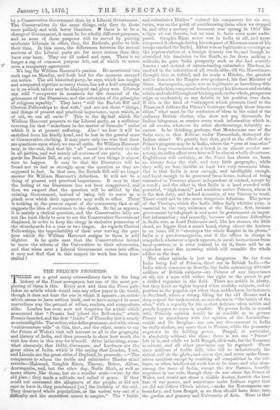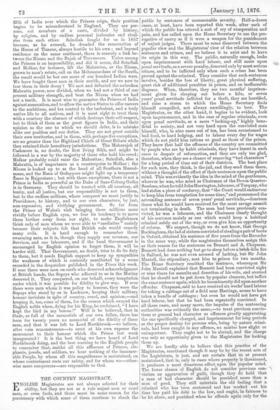THE PRINCE'S PROGRESS.
THERE are a good many extraordinary facts in the long history of the Times newspaper, but one of the most per- plexing of them is this. Every now and then the Times pub- lishes an article which would ruin any other paper in the world, though it does not hurt the one in which it appears ; an article which seems to have written itself, and to have escaped in some marvellous way the perusal of editor, readers, and compositors alike. London has even now not forgotten the article which announced that "Prussia had joined the Zollverein," which Prussia founded, and the first " leader " of Thursday last is nearly as unintelligible. The writer, who defies grammar, and with whom "achievements tells" us this, that, and the other, wants to say the Prince of Wales's visit will interest us all in the geography and history of India, and then proceeds to show how much the visit has done in this way for himself. After intimating, some- what obscurely, that Delhi, Cawnpore, and Lucknow are the great cities of India, which is like saying that London, York, and Lincoln are the great cities of England, he proceeds:—" The conquerors to whom the feeble and submissive Hindoo mind reverts—Mahmud, Genghis Khan, Timour, Baber, Akbar, Aurungzebe, and, but the other day, Nadir Shah, as well as many others like them, but on a smaller scale—went by the old plan ; they made a solitude and called it peace. If they could not command the allegiance of the people, or did not care to have it, they proclaimed [sic] the lordship of the soil. They destroyed whole populations, as the easiest way oat of a difficulty and the smoothest course to empire." The "feeble and submissive Hindoo " resisted his conquerors for six cen- turies, was on the point of overthrowing them when we stepped in, and after a century of incessant war sprang in 1857 like a tiger at our throats, but we turn to facts even more undis- puted. Genghis Khan never was in India at all, and never conquered it, though during his conquest of Kharesm some of his troops reached the Sutlej. Akbar was as legitimate a sovereign as. the representative of a foreign dynasty can be, and though he • stretched his dominion to the South, so far from making a. solitude, he gave India prosperity such as she had scarcely known ; and instead of exterminating submissive Hindoos, he • exulted in the toleration of all creeds alike, till the lfussulmans. thought him an infidel, and he made a Hindoo, the greatest native financier the Empire ever produced, his first Minister of State. Aurungzebe, again, was as legitimate as hereditary title could make him, conquered nobody except his kinsmen and certain rebels, and ruled throughout his long and, on the whole, prosperous reign as moderately as any Asiatic in his position ever does. If this is the kind of "retrospect which presents itself to the Times, as it follows the Prince's footsteps through these famous cities," what must be the confusion of ideas in the mind of the ordinary British elector, who does not pay thousands for Indian telegrams, or receive every week information which is, at all events, whatever its other shortcomings, tolerably ac- curate. Is he thinking, perhaps, that Montezuma was of the Solar race, or that Bolivar, under Ferozeshah, destroyed the Indian cities? We greatly fear that, good as the effect of the Prince's progress may be in India, where the "year of tamashas" will be long remembered as a break in an almost secular mo- notony, its reflex effect over here will be almost wholly disastrous. Englishmen will certainly, as the Times has shown us, learn no history from the visit, and very little geography, while they will, we fear, imbibe at least two very erroneous ideas. One is that India is near enough, and intelligible enough, and loyal enough to be governed from home, instead of being entrusted to Viceroys almost independent of control, except by a recall ; and the other is, that India is a land crowded with powerful, "high-toned," and sensitive native Princes, whom it is the first duty, and indeed necessity, of any Viceroy to court. There could not be two more dangerous delusions. The power of the Viceroys, which the India Office daily whittles away, is essential to the very existence of the Empire ; first, because government by telegraph is and must be government on imper- fect information ; and secondly, because all serious difficulties in India rise, as Lord Dalhousie said, like her storms, the little cloud, no bigger than a man's hand, rising above the horizon in an hour, till it "envelopes the whole Empire in its gloom." India is a powder-magazine, and if the officer in charge is compelled, whenever a spark appears, to await instructions from head-quarters, or is even trained to do it, there will be an explosion some fine morning which will crumble the whole edifice in the dust.
The other mistake is just as dangerous. So far f rota- India being full of Princes, there are in British India—the India which concerns us directly, the India containing 200,000 millions of British subjects—no Princes of any importance at all, not a man with either the right or the power to put a drilled reghnent in the field. There are nobles in plenty, but they have no rights beyond other wealthy subjects, and no position in the popular eye other than nobles have, for instance, in Scotland, where a strong liking for the old Houses and a deep respect for rank coexist, as was shown in "the battle of the sites," with a capacity for the coolest defiance when nobles and people happen to come in conflict. To govern India in accord. with Princely opinion would be as sensible as to govern France in accordance with the opinion of the Larochefou- caulds and De Broglies ; nor can any Government in India be really shaken, any more than in France, while the peasantry acquiesce in its holding power. Bengal, in particular, is absolutely without the class ; there is not one -" Prince " left in it, and while we hold Bengal, all is safe, for the Treasury is solvent, and all other provinces can be regained. Those sixty millions of feeble folk, who till so industriously the richest soil on the globe, and never riot, and never make them- selves manifest except by crushing all competition in the col- leges, or when intellectual work has to be done, and who alone among the races of India, except the few Parsees, heartily acquiesce in our rule, though they do not cheer the Prince of Wales, and would not cheer a visible Avatar, furnish the true base of our power' and sometimes make Indians regret that we did not follow Olive's advice,—make the Kuramnassa our boundary, and turn Bengal, as we then should have done, into the garden and granary and University of Asia. Even in that them farther away from our sight, to make Englishmen of his sentence mainly as one which would keep a habitual think only of men whom we were able to "mediatise " mainly criminal safely out of the way, or even give him an opportunity because their subjects felt that British rule would remedy of reform. We suspect, though we do not know, that George many evils. It is hard enough to remember those Buckingham, the lad of sixteen convicted of stealing a pair of boots swarming ants, as it is, though they supply our revenue, our in Oxford, obtained his sentence of five years from the Recorder Services, and our labourers, and if the local Government is in the same way, while the magistrates themselves assign this encouraged by English opinion to forget them, it will be as their reason for the sentences on Bennett and A. Chapman. harder still. That Government, no doubt, tries to do its duty Bennett had done nothing but go to sleep before a brick-kiln fire to them, but it needs English support to keep up sympathies in Salford, he was not even accused of lurking, but Sir John the weakness of which is curiously manifested by a scene Mantel', the stipendiary, sent him to prison for two months. recorded in the despatches published in the Times this week. The Home Secretary remitted the sentence, whereupon Sir If ever there were men on earth who deserved acknowledgment John Mantell explained that Bennett had been convicted eight at British hands, the Sepoys who adhered to us in the Mutiny or nine times for assaults and desertion of his wife, and averred deserved it. They conquered, on our behalf, every temptation that he should not be put down by popular clamour, but inflict under which it was possible for fidelity to give way. If ever the same sentence again, which he incontinently did upon another there were men whom it was policy to honour, they were the offender. Chapman, said to have received six weeks' hard labour Sepoys who stood by us in Lucknow, keeping their military for taking a cabbage out of a field near Hastings, seems to have honour inviolate in spite of country, creed, and opinion,—and taken a bundle of cabbages; • but even he Would not have got keeping it, too, some of them, for the reason which swayed the hard labour, but that he had been repeatedly convicted. In English noble when, dying for his King, he exclaimed, "I have all these cases, and many more, the impulse of the sentencing kept the bird in my bosom !" Will it be believed, that in authorities was evidently the same,—to treat previous convic- Oude, so full of the memorials of our own fallen, there has tions or general bad character as offences greatly aggravating been for twenty years no memorial of the fidelity of these the one specifically charged, and imprisonment for long periods men, and that it was left to Lord Northbrook—we believe, as the proper destiny for persons who, being by nature crimi- after vain remonstrances—to erect at his own expense the nals, had been caught in any offence, no matter how slight or monument to their honour which the Prince last week unimportant. They ought not to be abroad, and the charge inaugurated ? It is the best thing we have heard of Lord was only an opportunity given to the Magistrates for locking Northbrook doing, and the best warning to the English people them up. to remember that, amidst all this affluence of Princes, ele- We are hardly• able to believe that this practice of the phants, jewels, and soldiers, we hear nothing of the innumer- Magistrates, sanctioned though it may be by the recent acts of able People, by whom all this magnificence is maintained, on the Legislature, is just, and are certain that as at present whose contentment rests our safety, and for whom we—other- maintained, that is, only in cases where property is threatened, wise mere conquerors—are responsible to God, it produces a most disastrous effect upon the popular mind.



































 Previous page
Previous page